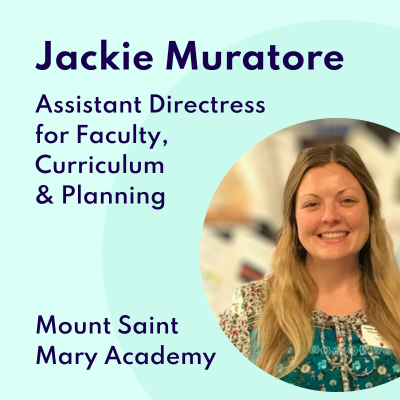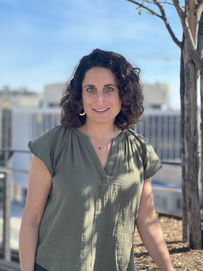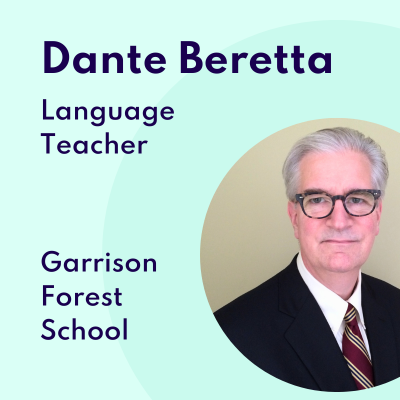|
One Schoolhouse partners with independent schools to advance their diverse approaches to education through our Academic Program and the Association for Academic Leaders. When we are successful in our mission, our partner schools deliver excellent, sustainable, and inclusive programs that equip learners for the future. Our Academic Program is designed to supplement exceptional independent schools and to help Academic Leaders fill out a robust academic program for their community. It does not endeavor to replicate holistic school life, but we do seek to support students in developing essential competencies, challenge them with dynamic learning experiences, and prepare them for college. Courses in our Academic Program are intentionally developed to be learner-driven, informed by seminal and emerging education research, and iterated on by data gathered within our own living practice. The pedagogical approach is designed backwards from competencies and the lessons are personalized to honor learners’ unique needs and identities. This approach suits this particular moment well, as educators deeply consider what it means to learn, how learning experiences are designed and facilitated, and how learning is measured and assessed. We are asking foundational questions, such as: what is knowledge? Who has it? What creates it? And what voices, sources, and experiences contribute to its creation and dissemination? Teaching and learning are evolving to meet current needs, and a pedagogy that focuses on developing competencies in the learner has the flexibility to be able to meet this moment.
0 Comments
Independent schools and Academic Leaders often pride themselves on spotting talent. They look for it in students, colleagues, potential recruits, and rising leaders - and especially the last. When hunting for leadership talent within your school, it's crucial to look beyond resumes and responsibility, and instead focus on transferable skills. Many independent schools celebrate and honor teachers who remain committed to teaching throughout their careers, without desiring other roles within the school. These teachers shine when they share their insights and lead professional development, while remaining in the classroom. The skills teachers build in the classroom don’t always translate directly into the desire or the preparation for days spent leading adults. The role of a department leader or instructional coach, however, should be given to someone who wants to help other adults develop. If you've only seen a teacher in a classroom, it can be tough to imagine how they can lead other professionals. That's why Academic Leaders need to focus on educators' skills and competencies rather than traditional criteria like education or years of experience. (In fact, we offer a course each fall titled Evaluating Department Leaders as Academic Leaders). This approach means you're drawing from a broader and more diverse pool to discover new talent. So what skills should Academic Leaders be looking for when they’re talent-spotting? In Rebecca Knight’s December 2023 Harvard Business Review article, “8 Essential Qualities of Successful Leaders,” she lays out the skills that leaders need today. Knight says leaders “tend to have intentionally put themselves in situations where they have to learn, adapt, and grow." Look for these 8 skills in your early-career teachers' classrooms to spot your future Academic Leaders. Want to more resources on attracting, hiring, and retaining best-fit educators? Association members, check out the rest of this blog in the Portal. Not a member? Learn more about the Association and join today!
Jackie recalls, “When my school moved to a new learning management system, I created and led the training modules for our teachers. I was able to use the unique skill set I developed designing and teaching online courses to lead our faculty through this transition.” Jackie credits One Schoolhouse with helping her navigate through the pandemic as an educator. As she puts it, “Because of my experience with One Schoolhouse, I was able to provide resources and guidance for teachers as we adapted to the remote learning setting during the pandemic. I also felt I was able to maintain connections with my students, despite the online setting we abruptly found ourselves in due to Covid.” Her experience with One Schoolhouse also shaped her teaching on campus. “As a math teacher, I always appreciated and focused on the importance of applying our course content to the real world. But One Schoolhouse inspired me to bring application to a whole new level, which I found to be very thoughtful and meaningful in both the online and face-to-face settings." As a One Schoolhouse instructor, Jackie appreciates the personalized learning approach that shapes each student's individual learning process. Jackie shares, “One of the many things One Schoolhouse focuses on is the actual learning process of each student. Through goals, reflection, discussion, and interaction with me and their peers, my online students take ownership and develop a strong awareness of their own learning.” As a course designer, Jackie is inspired by the approach that One Schoolhouse takes with regard to personalized pathways to learning. She reminisces, “I was surprised and excited by how much my online students enjoyed these new pathways to learning.” Jackie adds, “I admire how One Schoolhouse focuses on building connections with students and learning what individual students want and need.” Jackie acknowledges One Schoolhouse’s prominent role in shaping her career. "One Schoolhouse was integral to my growth as an educator, and it all started many years ago with designing and teaching an online summer Pre-Calculus course." Join the One Schoolhouse Faculty
Call for Teachers for the 2024-2025 school year is now open! Seeking teachers for advanced English, American Sign Language, Computer Science, French, and public health.
Access to Calculus is not a reflection of students’ ability to complete higher-level math courses. Often, it’s a reflection of the middle school students attended. That’s because in order to take Calculus in the senior year, students need to have completed Algebra I before starting high school. That’s fairly standard in independent schools, but just 24% of public school students take Algebra I in eighth grade.
As a result, independent high school math placement in ninth grade often aligns with whether or not a student attended an independent K-8, and because white students are dramatically over-represented in independent schools, white students are typically over-represented, first in ninth-grade Geometry, later in twelfth-grade Calculus, and, ultimately, in selective college admissions. Let’s go back to that course enrollment data. It’s worth noting that these are pre-pandemic numbers, and 2019 is the last year that data was available for this study. We do, however, have access to the number of students who took the AP® Exams in Calculus AB and Calculus BC. (Of course, the number of students who take the AP Exam isn’t equal to the number of students who completed the course, but that data isn’t readily available.) Between 2009 and 2018, the number of students taking the AP Exam in Calculus (both AB and BC) rose steadily. Since 2019, however, the number of students taking the same exams has dropped each year. Certainly, the pandemic accelerated this trend–but it’s worth noting that the drop started in the last academic year that was unaffected by the pandemic. The pathway to Calculus seems to be narrowing–and that’s not good for equity or achievement. Math achievement in high school shouldn’t be determined by the education a student has access to in middle school–and it doesn’t have to be. We’re proud that our offerings help schools expand access to Calculus instead of restricting it. Our summer math courses are used by schools to build equity in their academic programs. Here’s how it can work in a typical math sequence: Students who enter high school without Algebra I take the course as ninth graders. In the summer before tenth grade, they enroll in One Schoolhouse’s Summer Geometry course, which covers a full year of material in eight weeks. (Frequently, schools subsidize or cover the cost of the course as part of their tuition assistance package.) Those students return to school in the fall of tenth grade, ready for Algebra II, on track for Calculus and the college application process in their senior year. Another option we see frequently shifts summer work a year later. Students take both Algebra I (in ninth grade) and Geometry (in tenth grade) on campus. With a little more academic maturity, these students enroll in Summer Algebra II and complete a full year’s worth of content in the summer before eleventh grade. They’re ready to take Precalculus as high school juniors–the course that’s our third summer equity-boosting option. We’re excited to be one of the first programs offering AP Precalculus. When the College Board announced the course, it was with the explicit goal of making an AP mathematics course accessible to students who take Algebra I in ninth grade. There’s another, less obvious reason to consider AP Precalculus as an equity booster: because math is the most tracked subject in American high schools. When high schools welcome new students in ninth grade, the student’s math placement is an educated guess based on their middle school transcript, test scores, or recommendations. Recommendations and evaluations, however, are subject to unconscious bias. A 2019 study discovered that “teachers displayed no detectable bias when assessing the correctness of students’ solutions; however, when assessing students’ mathematical ability, biases against Black, Hispanic, and female students were revealed.” The students who are underestimated in the placement process are most likely to be Black or Hispanic girls. As these students goes through their high school math courses, expert teachers will recognize untapped potential. To move to a higher track, however, the student needs to surmount a knowledge gap. Math programs need to provide mobility for students to reach their full potential. For these students, AP Precalculus can fill in the knowledge gap between standard Calculus and AP or honors-level courses in senior year. Even as the new AP Precalculus course has the ability to open access to AP math courses, it doesn’t question the assumption that Calculus should be the zenith of the high school math curriculum–it cements the assumption instead. Math educators don’t want Calculus to be the solitary endpoint for high school math. The Mathematical Association of America and the National Council of Teachers of Mathematics issued a joint position statement in June 2022 that “a high school calculus course should not be the singular end goal of the PK–12 mathematics curriculum at the expense of providing a broad spectrum of mathematical preparation.” For a great conversation about the high school math curriculum, check out this 2019 Freakonomics podcast episode featuring professor Jo Boaler and College Board CEO David Coleman. Colleges and universities are also questioning that assumption. How might college admissions offices rethink their allegiance to Calculus? That’s a question math teachers, college counselors, and researchers are trying to answer. A 2021 report sponsored by Just Equations and NACAC, A New Calculus for College Admissions: How Policy, Practice, and Perceptions of High School Math Education Limit Equitable Access to College offers research and proposals to widen the pipeline to advanced mathematics, and to challenge college admissions officers’ assumptions about high school math. Taking Calculus in high school is important for students planning to enter STEM fields, but for others, advanced topics in statistics, data science, or other branches of applied mathematics will be far more useful as undergraduates and professionals. Until college admissions offices shift their thinking about Calculus, independent schools are stuck with an intractable problem. Highly selective colleges demand that students take Calculus, but students’ ability to take Calculus in high school is inequitable and determined by factors outside of their control. Schools need to ask how they can expand equity and access to provide students with the math knowledge they need to thrive in a rapidly changing world. We’re happy to be one of the answers.
“I struggled with the transition to online learning during COVID-19. It was then that I realized online learning is here to stay, and I needed to improve my approach,” Dante says. His pursuit of doing better led him to One Schoolhouse.
Dante knows how to build connections when he's in a classroom with students, but he worried about building connections and rapport with the students in his online asynchronous course. As the first semester began to pick up speed, he realized, “I get a sense of who the students are by the work they do,” just as he does in his classroom. And as he reviewed those first assignments, he realized, “This work is really good!” Teaching with One Schoolhouse has helped Dante re-evaluate his classroom practices. Online, he says, “You’re teaching your content, and you’re also teaching kids how to self-advocate and manage time.” In a classroom, the structures and schedules of school implicitly teach those skills; at One Schoolhouse, they're explicit in our course design, teacher facilitation, and professional coaching. “It made me more aware of the value of teaching time management,” Dante adds. That awareness brought a new clarity to Dante's classroom teaching: “Part of my job as a teacher is to develop skills that will help students in the long term outside the classroom, living and working with other human beings you need to be accountable to.” Independence and agency aren't buzzwords; they're real world skills our students need as they look to college and beyond. Dante recognized the changing landscape of education and embraced the challenge of adapting his teaching methods. Embracing change isn't just about staying relevant; it's about constantly striving for better ways to educate and inspire learners today and in the future. That's why One Schoolhouse creates opportunities for our teachers to grow and evolve as educators--because the best teachers are always learning. Want to learn more about teaching with One Schoolhouse? Fill our our teacher interest form online. |
Don't miss our weekly blog posts by joining our newsletter mailing list below:AuthorsBrad Rathgeber (he/him/his) Archives
July 2024
Categories |
||||||||||||




 RSS Feed
RSS Feed